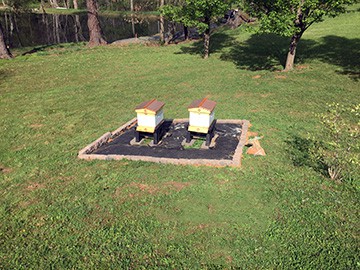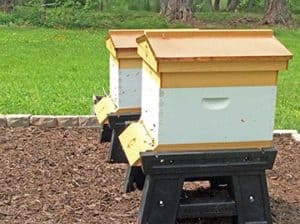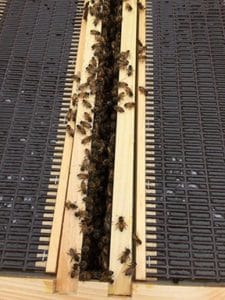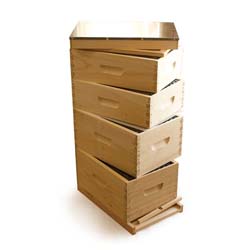One Hive, Two Hives . . .
When I decided that I definitely wanted to become a beekeeper, I instantly started considering whether or not I would do one hive or two hives. My initial snap decision was that I would use this year as a learning year. I would get my bees and hive equipment next year.
So I began the process of looking for a beginner beekeeping class to become more educated about the choices I needed to make in caring for the bees, equipment to purchase, and do’s and don’ts for a new beekeeper. Many beginner beekeeping classes happen in early winter, either January or February, and that was the case with our beekeepers club in Waynesville.
I really wanted an in-person class but new I had unfortunately missed my opportunity for a local class. That started a quest to find an alternative. Since I work in technology and have a past background working in distance learning, I decided to look around the web to see if I could find an online beginner’s class.
To my surprise, I found PerfectBee’s online course and immediately signed up so that I could start going through the content. I have to say that the course exceeded my expectations and taught me quite a bit.
One article in particular caught my attention, Why Have More Than One Beehive?. Reading through this article and my own personal reading made me wonder if I had made a good decision to go with one hive. Naturally, being cost conscious I wanted my start as a beekeeper to be on solid footing. What’s a new beekeeper to do?
Considering Key Points
Mark’s article contains six key elements to consider when deciding whether to start with a single hive or two hives:
- The element of chance – Despite our best efforts as beekeepers, sometimes, to coin a phrase, “the odds will not ever be in our favor.” Mites, starvation, and other issues can cause a dead-out and if we have only one hive we have to start all over again next spring.
- Gaining twice the experience – Two hives means you gain more experience working with your bees. You have the opportunity to learn more and learn faster with two hives present as you observe how each hive reacts and handles challenges.
- Having a safety net – If you have a single hive and that is having difficulties there is very little you can do to give it an assist. That second hive gives you the chance to give a queenless hive uncapped brood to raise a new queen or even capped brood to simply strengthen a weaker hive. As the old saying goes, there is safety in numbers.
- Compare and contrast – Having two hives gives you the chance to compare the two hives, as each queen will have her own characteristics and genetics. Each hive will behave and progress differently. As beekeepers, I believe we are amateur naturalists and we do ourselves and all of our fellow beekeepers a great deal of good by record-keeping which means maintaining records of our inspections, treatments, and each colony’s behavior and reaction to environmental challenge. More on my philosophy of record-keeping in a future blog post! Be forewarned, I’m a data guy who worked as an institutional researcher in a former career path, which means I like analyzing progress or decline and then explaining why it happened.
- Structured troubleshooting – So in keeping with the concept of beekeeper as an amateur naturalist, we make use of the scientific method to aid us in considering how a change to possible treatment method in one hive improved the overall health of that hive and then compare it to the control hive which received our normal treatment protocol. You didn’t know things were going to get this geeky did you!?!
- Not Twice As Much – Now I am someone who believes in using his hard-earned money wisely. Does that mean I always do so? Of course not, none of us do. But, budgeting is important. The second hive and second package of bees add costs. But, there are some tools and supplies that will be used with both or multiple hives. The cost was one element that was definitely on my mind as I read this article and started talking to other beekeepers.
I encourage you to not only read my blog post but read Mark’s entire post. My summary of the key concepts in my own terminology and thought process doesn’t do his more detailed explanations justice.
[pullquote align=”normal”]I like pulling on a baggy bee suit, forgetting myself and getting as close to the bees’ lives as they will let me, remembering in the process that there is more to life than the merely human.
Sue Hubbell, A Book of Bees: And How to Keep Them [/pullquote]
Still Undecided – Evidence Mounting
So at this point, I had taken the PerfectBee course but still really wanted an in-person course. I wanted to have an experienced beekeeper to speak to about my thoughts and concerns.
As luck would have it, our local bee shop, Wild Mountain Bees, was hosting a new beekeepers class in their shop. My excitement was building through all of this. I had read copiously, had finished the online class, and had signed up for an in-person class.
A pleasant surprise awaited me at my beginner’s class. Sarah McKinney was our teacher and she is a natural born storyteller. I had no idea that one person could fit so much information into six short hours.
During class, someone asked if there was an advantage to starting with two hives. My attention level definitely rose at that moment because this was the element that I was struggling with. Sarah’s and Mark’s recommendations agreed and convinced me that two hives helped the new beekeeper gain a better understanding of hive behavior and recover from potential problems.
My plan to do my research and learn this year then begin beekeeping next year died! The die cast; I decided not to wait. I reached out to some of my fellow beekeepers in the county. They shared their thoughts about one vs. two hives.
In every case, they all said that I could start with one hive, but a second gave me a fallback if something went wrong. It would also give me a comparison point to know how well the hive was really doing. The evidence was incontrovertible to me.
The Decision
The logical choice was to start with two hives. I knew this would add start-up costs. But the researcher in me also knew the importance of having comparison points in data analysis.
I was sold and began the equipment decision-making process. Which type of hive would I choose? What equipment would I need to purchase? Should I go with a nuc or a package, and more.
I was now ready to get my bees started this year. The pictures I’ve included with this second post are of my two hives. Next week, I’ll begin discussing my decisions concerning equipment with explanations of why I chose which equipment.
Until then, happy beekeeping!



